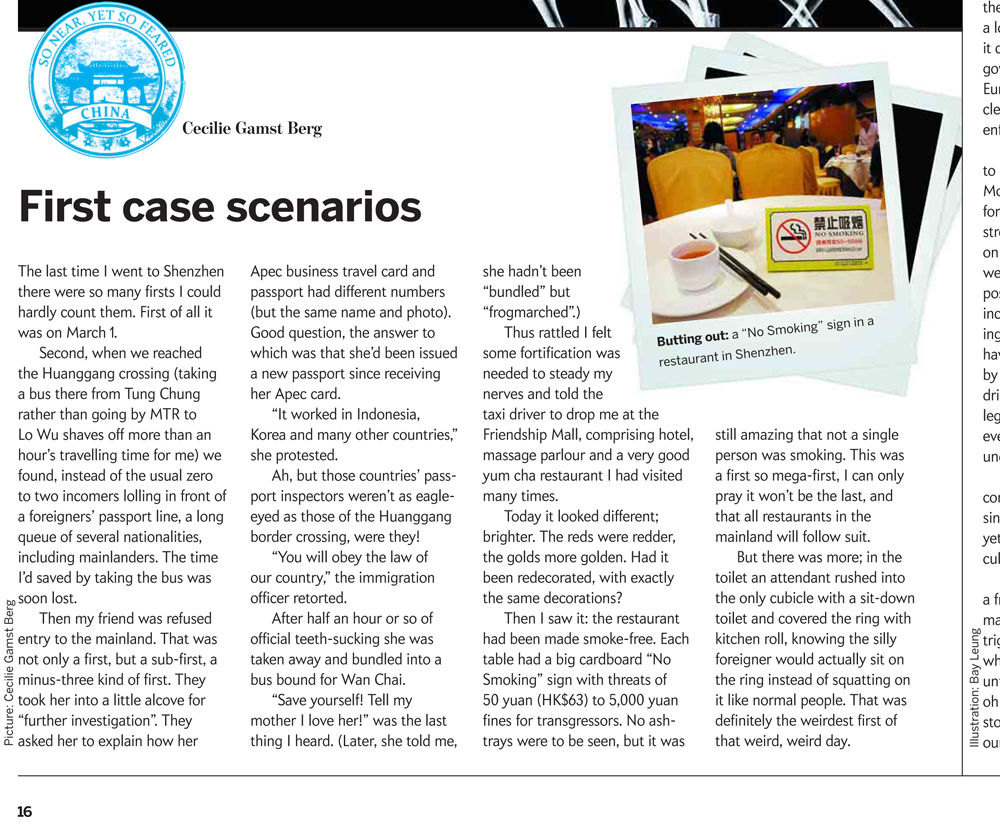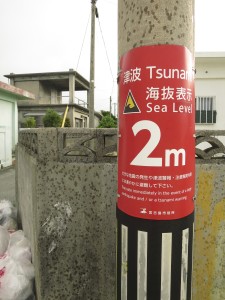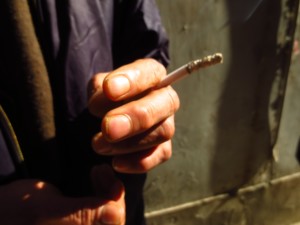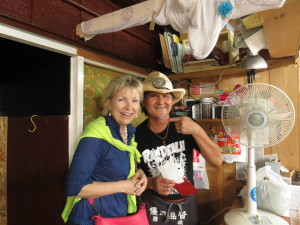- Details
Smoke Comes Out Your Arse
Smoke! Is it just me or has Central become unbearable after the smoking ban was implemented? I’ve become one of those middle-aged hags who sniffily wave her hand in front of her face while walking, or rather, negotiating the palls of smoke hanging over each dustbin between the ferry pier and my office. (“My office” being of course Honolulu Coffee and Cake Shop where I work as dogsie bodie.)
In Cantonese,’to smoke’ is 食煙,(sek yin – eat smoke). In the olden days we used to be asked 食唔食煙呀?(sek m sek yin ah? – Eat not eat smoke?) and if not eat smoke, be seated at least 5 cm from the nearest smoker… Happy times.

- Details
The Only Cantonese Lesson You’ll Ever Need (Crash Course in Light Conversation)
This week my first specialised crash course kicked off, with two excellent and fast learners, working titles ah-Lei and ah-Ga. In only two and a half hours, they learnt enough Cantonese to go into any →
Chinese Characters
Chinese characters (normal, not simplified) are beautiful, aren’t they? Even ordinary words like ‘toilet’ look somehow elevated to a higher sphere when they’re written with a brush, or printed for that matter. Not that the →
Learn Cantonese Without Really Trying: New Products
People are busy and don’t always have time to commit to one or two hours of studying Cantonese every week. But does that mean you can’t learn Cantonese? NO! With Happy Jellyfish Language Bureau’s many →
China Toilet Groove (Contains Video)
Everyone who travels in China for more than, say, five minutes, has something to say about her toilets. But I stand by my column (above) – they are nothing! Nothing, compared to only a few →
Sichuan Food … So Yummy and Right Here in Pui O!
There are as many types of Chinese food as there are people in China; approximately 1.3 billion different dishes at last count. That's more dishes than you and I go through in an average month! →
Ordeal of the Year
In January, okay, I admit it, I waited until the first week of February, came my annual ordeal: The visit to the vet. Why ordeal? It’s just some injections, and they’re not even on me. →
Stimulate All Your Senses on Lantau. Yes, all! Sichuan Cooking Course
Chinese New Year saw the Lo Uk Tsuen Country Club full of people coming to learn the basics of Sichuan cooking. Mature and younger, Lantau people and people from as far away as Britain – →
Congratulations, Get Rich!
It’s Chinese new year and the streets (and Facebook) reverberates to foreigners calling out to each other: “KUNG hei fat choi!” For one thing it should be GUNG hei, but hey. The tradition of spelling →
Enormous Oversight
About those language teaching videos (one Cantonese for beginners, one Cantonese for the more adventurous and, yes! I admit it! Even a survival Mandarin video called Stay Grounded) – all these years they’ve had this →
肇慶 Beautiful Siu Heng – Great As Long As You Don’t Dabble
Oh China. I love you so much. This is Siu Heng, the town where, on top of the many scraggy crags, there are signs (signage) exhorting people not to “parapet”. No Parapeting! the signs say →
- Details
哎呀,落雨呀!Bucketing Down
Yesterday I went on a high-speed boat trip ruining my hair, but it was worth it. As soon as we got off the open boat, it started raining like – well, normal Hong Kong style. →
川菜!Sichuan food! The best in the world!
Yammmmm! Yam me doooown! That’s right, I don’t spell the word you say when something tastes good, with a U. I prefer the letter A. Take a word like 蚊, (man, meaning mosquito but also →
Consistent Service
I’ve almost given up going to restaurants in Hong Kong. I find the food tasteless, the chefs complacent. But there’s one place right here in throbbing metropolis Mui Wo, the venerable Rome Restaurant, that I →
Cantonese and English: The Twain Shall Never Meet so Just Accept It
“Oh sorry, I’m so sorry” this woman is probably not saying. Naw, she’s just serving me some excellent Sichuan food, probably. Anyway, I can’t begin to think how weird it must be for the people →
Neighbour In The Middle of Nowhere
It was cold, foggy and not without drizzle, yet we were glad to be up so early and by ourselves at this Trollveggen that I had heard so much about but never visited. It looked →
Long Live Cantonese
There’s a big hullabaloo in the South China Morning Post this week. Historian Jason Wordie wrote about the so-called Third Culture Kids (born in one country, moved to Hong Kong, sent to boarding school in →
Taxing, Vexing Taxis
As any newcomer to Hong Kong trying to get a handle on the local language can attest to, taxi drivers are excellent language teachers. At the same time, they can also get very angry if →
Local Uncle Writes Own Language Wrong!!!!!
I have just (“just” meaning three weeks ago) come back from Norway, and while I was there I sent various postcards, among them to an uncle in my village. What, your uncle lives in your →
Change
I needed an excuse to publish this photo. It was taken in Shenzhen (naturally) in what used to be an excellent little forest just across the square from the train station but which is now →
New Music Video
Ah, young love. It is splendid. ‘taller than’ is 高過 (gou go) whereas just ‘taller’ is 高啲 (gou di)。Could it be any easier?
- Details
Miyakojima! 宮古島
The mainland is all well and good, in fact better than well and certainly better than good, but there other countries around here. Japan for example. Not that this tiny island that’s much closer to Hong Kong than it is to Tokyo is much like Japan as I know it. It’s just – itself!

Miyako belongs to Okinawa prefecture and has its own language and culture. And unlike China, Japan isn’t trying to eradicate this language and this culture. The Miyako people are – guess what – just getting on with it without interference!
Sure, they use hiragana, katakana and kanji (Chinese characters) but use the hiragana to write words in the Okinawa language.
Meanwhile Hong Kong is being flooded with simplified characters and the faux, esperanto-like Mandarin writing, the communist party’s take on Chinese history and with the Mandarin language itself.

It really makes me irate, vexed and dismayed.
宮古島 – Gong Gu Dou (Palace Ancient Island/Miyakojima)
日本 – Yat Bun (Sun Area/Japan)
簡體字 – Gan Tai Tsi (simplified characters)
- Details
Walk Some Steps For The Cause
WEI! Everybody everywhere! I’m off to the motherland for a long but not long enough weekend, to make programmes about … oh, I can’t talk about it. OK, Mandarin. Anyway, when I get back next week, does anyone want to do:
1. Guerrilla Cantonese
and 2: Learn how to read and write Chinese characters without really trying?
Number 2 will be early afternoon, number 1 early evening followed by pub crawl. Roll up, roll up!!!!
And Sunday: Sichuan food at my personal restaurant?
Contact us today
Email info@learncantonese.com.hk
to find out how you can start learning Cantonese.




